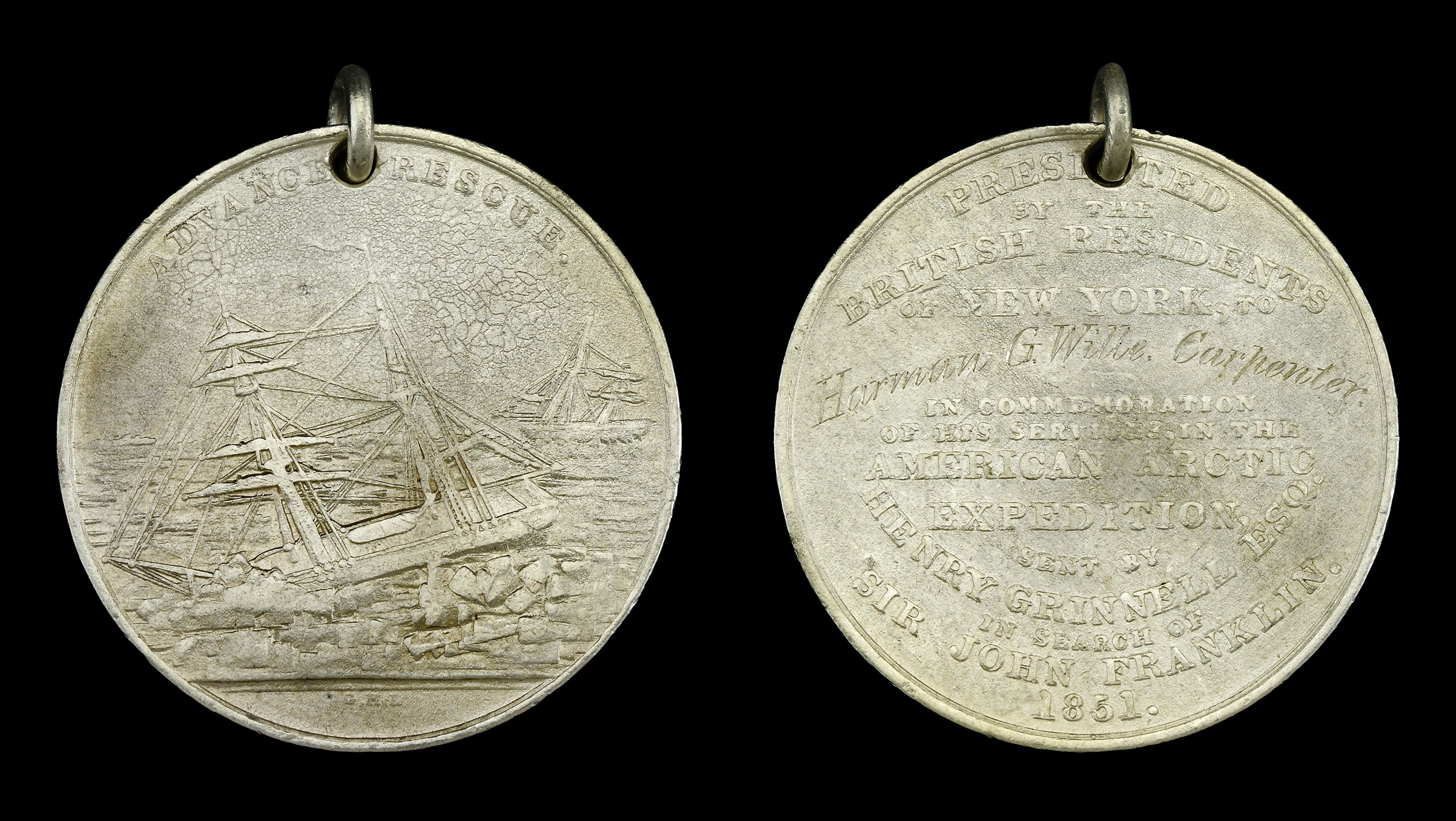The rare First Grinnell Arctic Expedition Medal awarded to Harman G. Wille, Carpenter, United States Navy, for services in the American brig Rescue American Arctic Expedition Medal 1851, obverse: two sailing ships stuck fast in ice, ‘Advance [&] Rescue’; reverse, inscription in raised lettering, name engraved in running script, ‘Presented by the British Residents of New York, to Harman G. Wille, Carpenter, in commemoration of his services, in the American Arctic Expedition, sent by Henry Grinnell Esq. in search of Sir John Franklin, 1851’, 38mm., silver, pierced with ring suspension, cleaned, pitted surface through fire damage, otherwise nearly very fine and very rare £5,000-£7,000 --- Importation Duty This lot is subject to importation duty of 5% on the hammer price unless exported outside the UK --- --- Harman G. Wille, U.S.N., served as a Carpenter aboard the Rescue. In 1845 Sir John Franklin was given the command of Erebus and Terror and was appointed to lead an expedition to find the North West Passage. The expedition set out from Lancaster Sound on 19 May 1845 and were last seen by any European in July of that year. Sir John died on 11 July 1847 and by the Spring of 1848, all 129 men of the expedition had perished in that icy waste. With his fate and that of his men unknown, over forty attempts were made by land and sea over the next 30 years to search for the lost expedition. Rewards and appeals by the Admiralty and Lady Franklin fuelled the searches. These expeditions were to find relics and remains of the Franklin expedition and in the process were able to advance the knowledge of that desolate part of the world. Following an appeal in 1850 by Lady Franklin to President Zachary Taylor to send a search expedition, a wealthy New York Merchant and Philanthropist, Henry Grinnell, offered to fund two ships, the Advance and Rescue. The ships, of 144 and 64 tons respectively, were placed under the command of Lieutenant Edwin de Haven, U.S.N. and were manned by U.S. Navy volunteers, 33 in all. The well provisioned ships cast off from New York in May 1850 to the rousing cheers of many spectators. On 19 August 1850 the two ships entered Lancaster Sound and found there, two British ships, the Lady Franklin and Sophia, part of the British Arctic Expedition of 1850-51 funded by Lady Franklin. Together they began their search. They were to discover Franklin’s Winter quarters for 1846 and the graves of three men who had died early on. In September, deterioration in the weather prompted a return to the south but the two vessels became fast in the ice in the Wellington Channel and it became necessary for the crews to prepare for a Winter in the Arctic. The crews survived the harsh winter, and due to their small size and robust construction, the two ships survived being crushed by the ice. In April 1851 the crews were able to return to their ships and in June they finally won free of the ice. In July, after replenishing their supplies from two British whalers, De Haven again took his ships north to renew the search but deteriorating conditions in August forced him back. The Advance arrived back in New York on 30 September 1851 and the Rescue a week later. Each of the 33 men (Advance 16 and Rescue 17) of the gallant expedition received the above silver medal funded and awarded by British residents in New York and a sum of money. The presentation took place on 13 November 1851 on board the U.S.S. North Carolina. In addition each man was awarded the British Arctic Discoveries Medal 1818-55, Wille’s award being sent to Lord Napier, British Minister at Washington, for onward delivery to Wille himself. The above medal is one of three known; the others to ‘Thomas Dunning’ and to Lieutenant Edwin J. De Haven, both of the Advance.





